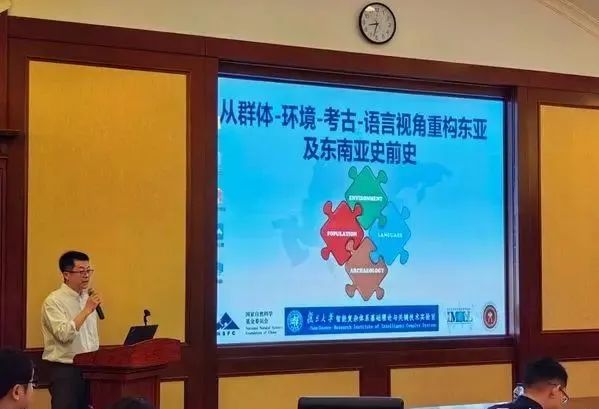On September 23, 2023, the symposium on “Reconstruction of East and Southeast Asian prehistory from the perspective of population-environment-archeology-language” was successfully held in Zibin Building, Handan Campus, Fudan University, which is supported by Special Project (project of science and technology activities), Department of Interdisciplinary Science, National Natural Science Foundation of China and initiated by Research Institute of Intelligent Complex Systems, Fudan University.
Zhang Menghan, a researcher from Institute of Modern Languages and Linguistics of Fudan University and the deputy director of Research Institute of Intelligent Complex Systems, presided over the symposium. Xu Xiao, the vice president of Institute of Science and Technology of Fudan University, expressed the gratitude to National Natural Science Foundation of China on behalf of the university and introduced the university’s commitment to cross-science projects and recent initiatives to promote cross-research, including the academic salons of QingTing series and cross-research development salons.

Researcher Kong Qingpeng, Researcher Zhang Xiaoming, Associate Researcher Yao Xi and Associate Researcher Li Yuchun from Kunming Institute of Zoology of Chinese Academy of Sciences, Professor Dong Guanghui and Associate Professor Ma Minmin from Lanzhou University, Researcher Zhang Hua from East Chine Normal University, Researcher Tan Liangcheng from Institute of Earth Environment of Chinese Academy of Sciences, Researcher Mao Xiaowei from University of Electronic Science and Technology of Chine, Researcher Zuo Xinxin from Fujian Normal University, Researcher Wang Can from Shandong University, Researcher Deng Lian from Fudan University, and many scholars from the Cross Section of the National Natural Science Foundation of China attended the symposium. Thirteen experts delivered presentations on many cutting-edge topics, such as human origin and evolution, human migration and evolution, temporal and spatial evolution of agriculture, the impact of climate change on human population structure and the evolution of languages in East and Southeast Asia.

The holding of the symposium began a series of activities of Future-oriented Complex Systems Science - Intersection and Integration. The conference was strongly supported by well-known experts and young scholars in related fields. The exchanges and interactions at the conference venue were activate, and the content of the report was forward-looking and inspiring, receiving positive feedback from participants.
It is reported that in recent years, the research on the source of civilization in East Asia and Southeast Asia has received continuous attention from Archaeology, Linguistics and other disciplines. From the perspective of complex systems science, the symposium combined Anthropology, Archaeology, History, Linguistics and other disciplines to promote the development of interdisciplinary researches, taking an important step forward in promoting interdisciplinary and integration practice. At the same time, the symposium actively built a new knowledge structure through in-depth integration to enhance the formation of new and richer knowledge categories and to product more valuable and more contributing research results.











